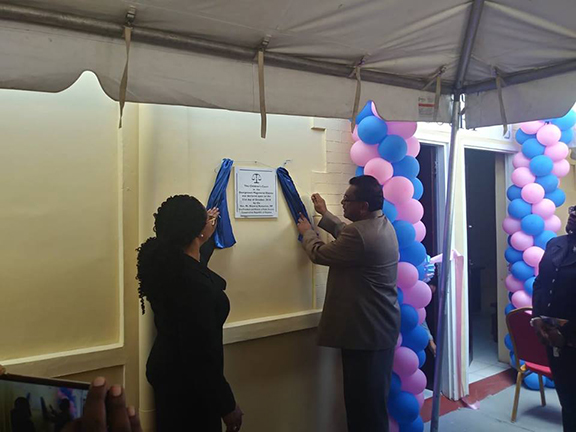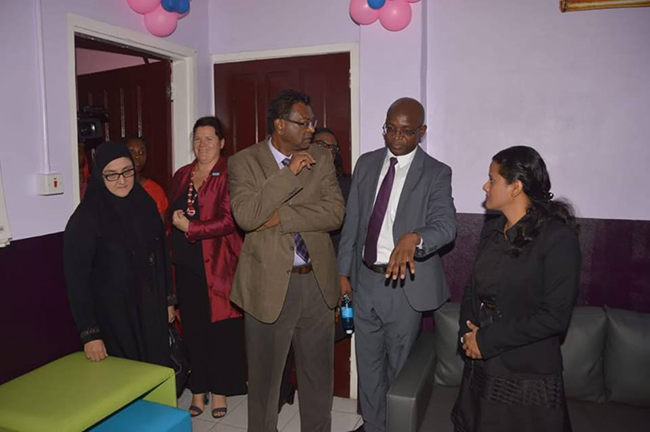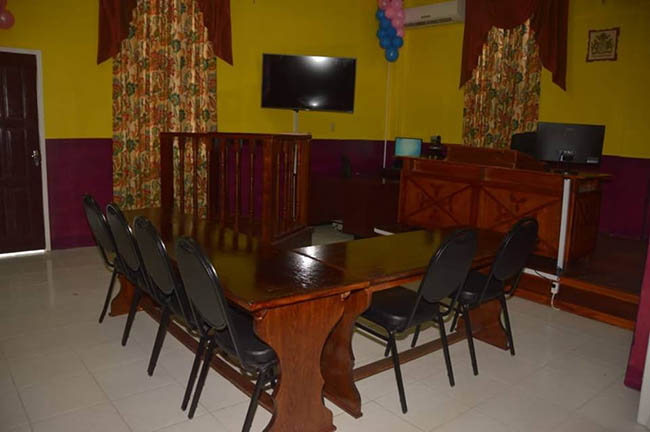It was a historic occasion yesterday at the Georgetown Magistrates’ Court as the first Children’s Court was commissioned, in keeping with the recently passed Juvenile Justice Act.
The Juvenile Justice Act, which was passed on March 22, 2018, is intended to amend and consolidate the law in relation to criminal justice for juveniles; to make provision for proceedings with respect to juvenile offenders; to provide for the establishment of facilities for the custody, education and rehabilitation of juvenile offenders; and to repeal the Juvenile Offenders Act and the Training Schools Act.
According to the definition given in the bill, a juvenile is a person who appears to be 14 years and older but less than 18 years old. It notes that it is presumed that no child under the age of 14 shall be capable of or guilty of committing an offence but if the presumption is rebutted, the child shall be treated and dealt with in accordance with the provisions set out in the bill.

During the programme yesterday, which was chaired by Justice Roxane George, the event saw the attendance of Chief Magistrate Ann McLennan, Attorney General (AG) Basil Williams, Justice Yonette Cummings-Edwards, Vice President and Minister of Public Security Khemraj Ramjattan, UNICEF representative to Guyana and Suriname Sylvie Fouet, along with magistrates Dylon Bess and Annette Singh.
As the remarks were made and the cultural items presented, one theme pervaded the programme, and that was the positivity and ray of hope that the opening of the court brings in (what Minister Ramjattan, in his speech described as) a “jail house nation.”
“Our Government of Guyana wants to see an act which reflect[s] this modern philosophy of juvenile justice, one which strengthens the justice system for juveniles and makes it more responsive to them and their situation,” Ramjattan noted in his feature address.
He went on to state, “We want to minimise that harsh punishment meted out to our

young offenders which then stigmatize them for life…We want to maximize their education, rehabilitation and reintegration into society”.
UNICEF representative, Fouet, pledged the agency’s continued support in the development of the Children’s Court. She stated that the opening of the court is very timely and a sustainable investment to the community.
In his address, AG Williams, among other things, expressed deep gratitude to those persons who were instrumental in the historic event, for their insight, drive and determination in the passing of the Act.
“We are establishing a gentler, caring and kinder nation, one in which children who may have gone astray can enjoy second chances and receive the support and assistance which they need to become what they can be”, he stated.
Those tasked with presiding over The Children’s Court are magistrates Bess and Singh, who have been sent on training to equip them for the task ahead.
Both magistrates, in their appreciation addresses, expressed gratitude for being chosen and being afforded various training opportunities, as well as noted their determination to execute justice at the hearings.
Subsequent to the unveiling of the new court’s plaque by Ramjattan and Justice Cummings-Edwards, a tour of the court’s facilities was facilitated for those in attendance.
The tour revealed vibrant colours, paintings and décor, which lined the various rooms. There was a play room, fully equipped with books and other amenities for children, a conference room, a briefing room, a courtroom, and other facilities.
The year 2019 is expected to see similar facilities being commissioned in Berbice and Essequibo.










